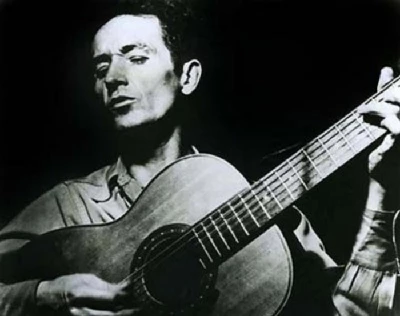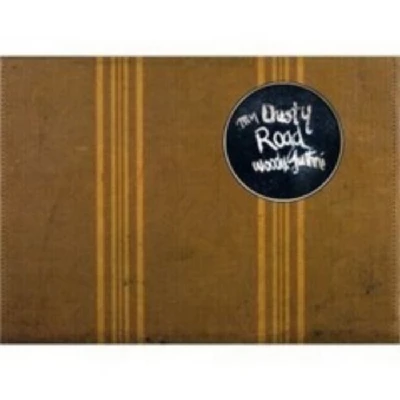published: 13 /
1 /
2010

American folk and protest singer Woody Guthrie's work has recently been compiled together and remastered on a four CD box set, 'My Dusty Road'. Jon Rogers examines and considers his career and tragic life
Article
American folk singer Woody Guthrie would have secured his place in the great American songbook tradition for his strong influence on a young Bob Dylan alone. But Guthrie has had an overreaching impact upon popular music.
Even by the time of his death in October 1967 from the hereditary degenerative wasting disease Huntingdon’s Chorea he had already achieved the status of folklore and was being seen as one of the most important figures in American music.
Possibly Guthrie did more than anyone for the association of folk music as “songs for working people” as well as protest music in the 50s and early 60s that was coming out of the McCarthy era and which helped fuel the Civil Rights movement as well as later campaigns to ‘Ban the Bomb’. According to the critic Greil Marcus, Guthrie was a “troubadour of the dispossessed, poet of the Great Depression, ghost of the American highway, a man blown by the wind and made out of dust.”
In his wake a whole group of so-called “Woody’s children” cropped up that not only included Dylan but the likes of Phil Ochs, Joan Baez and Tom Paxton. Even Dylan described himself as “like a Woody Guthrie jukebox”.
Guthrie’s influence on the folk tradition has been raked over endlessly already and his importance is pretty much self evident, but others outside of folk music have appreciated his talent.
That chronicler of blue-collar, US working-class life Bruce Springsteen fell under his spell with the singer of ‘Born in the USA’ calling Guthrie’s most famous song ‘This Land Is Your Land’ “the greatest song that is ever been written about America” as well as citing him as a big influence on songs like ‘The River’ and ‘Nebraska’ as well as perhaps his most famous song. Not only that but Springsteen has also been known to cover ‘I Ain’t Got No Home’.
Important he might be in the long tradition of American folk music, but it could be all too convenient to resign him to the history books and dismiss him as having little relevance with today’s slick, highly-polished pop tunes with their glossy MTV-friendly videos. But Guthrie still remains relevant thanks to his topicality with his concerns for the homeless and jobless as well as poverty, inequality and racism. Those concerns still seem highly pertinent today, either side of the Atlantic.
Born on 14 July 1912, Guthrie was like a musical version of John Steinbeck’s classic Depression-era novel ‘The Grapes of Wrath’ which detailed the displacement of the Okies (the farming people from Oklahoma) from their farmland due to the depression in the 1930s to “go west” to the supposed “promised land” of California.
Although Guthrie was more used to riding freight trains than getting his hands dirty in the fields, he drew on the oral tradition of folk song and “talkin’ blues” of slaves and agricultural and industrial workers who had previously sung about “the drudgery and occasional triumphs of their lives.” But in a style that would be picked up by Dylan instead of just doing covers of traditional songs, Guthrie would rework those tales to give them contemporary relevance as he did with ‘I Ain’t Got No Home in the World Anymore’ and ‘Dust Pneumonia Blues’ as well as ‘Stackolee’.
Guthrie’s natural affinity to the downtrodden led him to a fiercely left-wing political stance that would align him with the American Communist Party. While not necessarily jumping into bed with the left-wing party Guthrie formed close ties. He once famously quipped “I ain’t a communist necessarily but I been in the red all my life.” His guitar famously proclaimed, “This machine kills fascists.”
Not only would he use his songs to get his message across but also had a radio show for a while and wrote as a columnist for a number of radical papers such as ‘The Daily Worker’ and ‘The Light’ and developed into being a sort of spokesman for the dispossessed. As one columnist for the ‘People’s World’ put it in April 1940:
“Karl Marx wrote it, and Lincoln said it, and Lenin did it, Sing it, Woody, sing it!”
He’d begun to make something of a name for himself and had gone some way to make politics acceptable to a musical audience and had done his bit for transforming the Communist Party into a patriotic, Americanised party which called for a socialist unity and to fight Nazism in Europe. At the time Guthrie was at the height of his powers and also popularity.
But world events overtook him. With the signing of the Nazi-Soviet pact an anti-Socialist feeling swept across the nation and the word socialism became a dirty word almost over night. As a consequence Guthrie fell from favour and his career took a sharp downturn throwing him into poverty with a young family to support. Not to mention an unhappy marriage. Both no doubt contributed to his periods of heavy drinking.
Despite being in financial straits he kept his integrity and rejected highly lucrative attempts to transform him into some sort of singing cowboy like Jimmie Rodgers. He once said: “This damn Hollywood stuff, the stuff about love and champagne and flowers, it don’t talk in a worker’s language.”
But thanks to his friends like Leadbelly, Will Geer (who played Grandpa in ‘The Waltons’) and particularly Pete Seeger who began to popularise his songs, his career started to get back on track and Guthrie started to tour endlessly playing the likes of workers’ rallies with, initially, the Almanac Singers and then his own group the Headline Singers (which featured Leadbelly). With the publication of his autobiography ‘Bound for Glory’ in 1943 he was back to being something of a household name.
But once again Guthrie’s success was scuppered by world events and the entry of the United States into World War II due to Pearl Harbour. Guthrie did his bit for the war effort by joining up with the Merchant Navy and barely survived his ship being torpedoed in the Mediterranean.
After the war Guthrie was just as outspoken as ever but popular sentiment for him had turned. Any left-wing movement was shunned by almost everyone, even labour movements turned against anyone with even vaguely pink-ish credentials.
Unsurprisingly the House of Un-American Activities branded Guthrie a Communist and so made him, effectively, persona non-grata. ‘The Chicago Times’ described him as an “irresponsible hobo”.
Guthrie’s problems were compounded in the late 1940s by his slowly deteriorating health and creativity. Apart from the odd exception Guthrie was struggling to write songs of any substance and his famous recording sessions with Moses Asch in April 1946 left him physically drained.
Soon he was locked in a downward spiral of ill health, heavy drinking and depression which was compounded by the death of his daughter, aged 4, in 1947. His life started going from bad to worse. He was sentenced to 180 days in prison for sending obscene letters to a woman in California, came close to death in 1951 due to a ruptured appendix and physically assaulted his wife in 1952.
By now Guthrie was in the grip of Huntingdon’s Chorea and was slowly losing his mind in a similar way as his mother also had and a period of vagrancy began. Even though he was 40 he was described at the time as “bearded and shaggy, a bothersome, frightening old man." Ultimately he would recognise he was suffering in the same way as his mother had: “which lets me stay dizzy in my head everyday without paying my barman a penny." By the time he was 48 he was a trembling wreck due to his illness. He was losing his balance and his head lolled forward when he walked. He could barely write anything legible let alone play guitar or type
Guthrie might have met an ignoble end ending his days penniless and largely ignored at Greystone Park Hospital in Morris Plains, New Jersey, but his strength lies in his songwriting. Even though neo-Conservatives may have tried to co-opt his classic ‘This Land is Our Land’, the song still carries a punch and resonates today. A tradition that has been carried on by the likes of Billy Bragg and almost anyone who fancied themselves as something of a protest singer. Now Guthrie is seen, according to the Dylan biographer Howard Sounes, as the father of American folk music.
The force and power of Guthrie’s music can be felt in the latest four-CD set from Rounder who have previously released a number of important recordings by Guthrie, including the historical Library of Congress Recordings as well as ‘Dust Bowl Ballads’. This latest ‘My Dusty Road’ cleans up a whole selection of his recordings mainly from the mid 1940s but contains some of his most famous songs as well as a handful of previously unreleased tracks as well as ‘This Land is Our Land’, a recording which contains the (in)famous verse about ignoring trespassing signs. And there’s a minor classic in the previously unreleased ‘Tear the Fascist Down’, a wartime, patriotic call-to-arms. Most of the 54 tracks stem from a marathon six-day recording session Guthrie played on in New York in 1944.
But while the songs might be familiar the quality isn’t. All too often in the past recordings sounded like they were made decades ago with generally very poor quality and lots of surface noise but Rounder has cleaned them up and given them a clear quality, all sparkling for a digital age. The harmonica of Sonny Terry comes into its own as does the finger-picking style of guitarist Cisco Houston. You don’t normally get such precision and clarity on Guthrie recordings.
Picture Gallery:-
